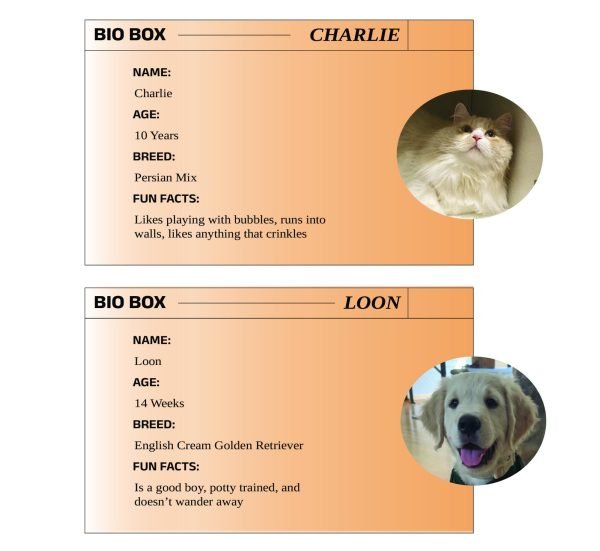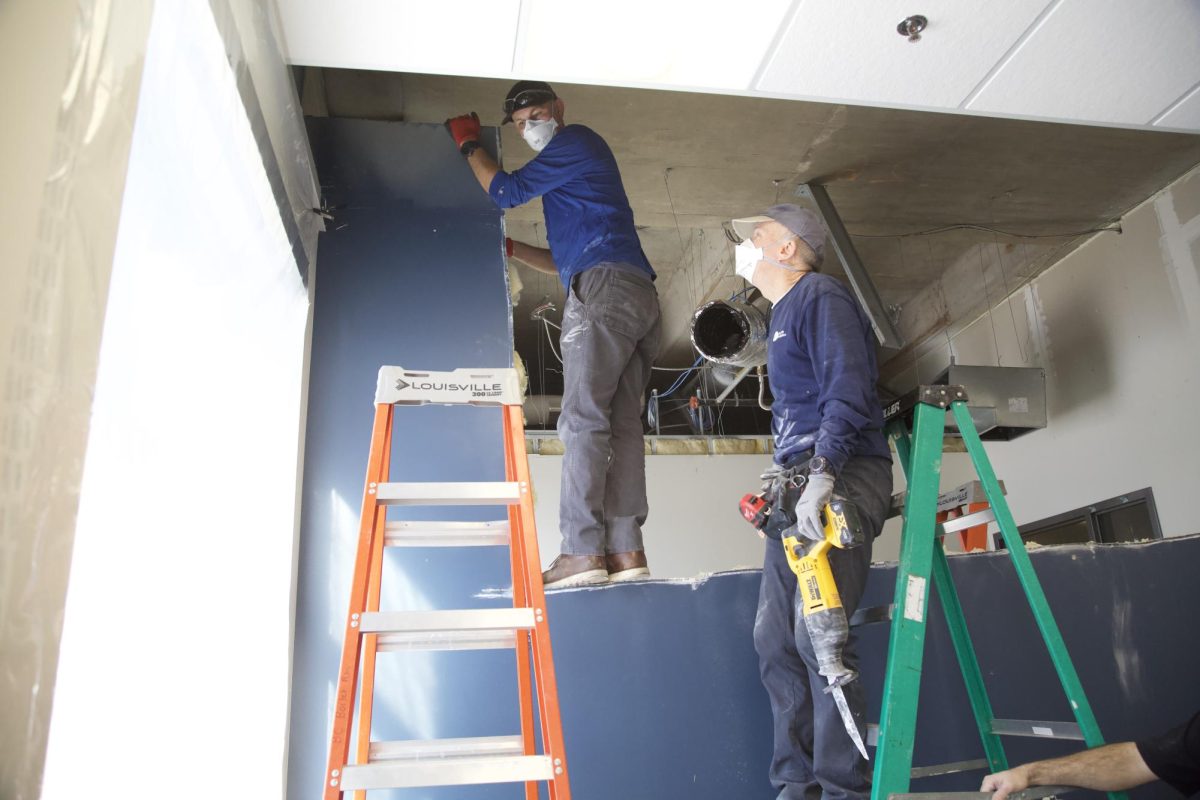As fire alarms blared throughout Lissner Hall, students filed through hallways and down stairwells to make their way to the Lakeside Center. Most were unbothered, keeping calm and chatting as they waited for the drill to end.
When the alarms went off in Lissner 312, however, the fire drill wasn’t so simple. For Izzy Friesen’s emotional support cat, Charlie, the alarm was a new and overwhelming sound. At the first screech, Charlie ran into Friesen’s room, hunkering down in his favorite spot – her bed – as Friesen panicked, trying to think over the noise of feet shuffling down the hall and a blaring alarm.
“Some of my roommates were like, ‘Oh, don’t worry, it’s just a drill,’” Friesen said. “But it was this moment of like, what do I do with my own animal for a fire drill?”
After rescuing her frightened cat from her bed and bringing him outside, Friesen stood by the LSC gripping Charlie close to her chest to prevent him from jumping out of her arms. For the rest of the drill, she contemplated sending a frustrated email to her Resident Director about the lack of notification about the fire drill for students with emotional support animals.
Students experiencing invisible conditions such as anxiety, depression, panic attacks or anything that falls under the Americans with Disabilities Act are allowed to have ESAs live with them on campus. Though caring for a pet on campus brings with it different responsibilities and regulations, ESAs provide special companionship and make the move to college more achievable for some students.
During Friesen’s first year at Bethel, she was missing classes every two or so weeks after coming down with a series of colds, or even in one case COVID-19. Dizziness and clouded thoughts plagued her due to blood pressure issues, and all of this resulted in a struggle to build a routine.
Charlie kept her accountable, waking her up on time and sometimes seeking Friesen or her roommates in their “regularly scheduled spots” around the suite to check in on them during the day.
Friesen was officially diagnosed with depression during her first interim at Bethel. After starting on medication, Friesen felt that using additional accommodations – such as an ESA – would be helpful not only for the sake of her academics, but also her social life. Although Friesen has taken a break from her time at Bethel due to continued health issues, she continues to visit campus often and is still in close contact with many of her friends.
Bethel’s Office of Accessibility Resources and Services must comply with federal and state laws that prohibit discrimination against individuals with disabilities. However, according to Director of OARS Liz Burd, providing students with accommodations means more than just compliance.
“[Having ESAs on campus] is really about honoring the kingdom of God,” Burd said. “When a student can have support like an ESA in their residence space, that can help them become successful in the classroom.”
For an ESA to live on campus, students must first submit a general accommodation request form, documentation from a licensed therapist explaining why the student would benefit from an ESA and an animal registration form, which asks questions about the pet’s breed, vaccination history and behavior.
Veterinary verification forms must be submitted to OARS, and the student must meet with the office for some informal interviews about why they want an ESA. The city of Arden Hills also requires pet owners to have a license for their animal – a tag with the owner’s contact information must be purchased by the student.
After the paperwork is completed, students are able to welcome their furry friends home to any of the suite-style or apartment housing options on campus. If the processes are not all complete and a student has an animal staying in their dorm without approval, the student is charged $25 a night.
Regulations do not allow ESAs in freshman housing due to space constraints, so some students who have had ESAs in the past come to Bethel without their animal. While attempting to navigate college on their own, some decide to get an accommodation to bring an ESA later on in their college career.
“The year before, [my roommate and I] had kind of been kicking the idea around of getting an ESA, and that was about when my parents were like, ‘You should bring the cat,’” Friesen said.
After three months of pet vaccinations, interviews with the OARS staff and form after form, Friesen and her sophomore roommates were ready to welcome Charlie the Persian mixed-breed cat into Lissner Hall with a catnip cupcake and a variety of new toys. Guests in their suite were often greeted with the quiet pitter patter of paws on the linoleum floor, Charlie begging for food (again) and only the occasional hairball.
“There’s nothing quite like opening your door and hearing an excited little meow,” Friesen said. “[Charlie] helped with a lot of loneliness, which was good for me.”
Not all application processes are the same. Some students encounter more challenges while completing the processes required to have an ESA on campus. Senior Louden Johnson is in the process of getting his fourteen-week-old English Cream golden retriever, Loon, registered to be his ESA in North Village.

Johnson’s regular therapist is on maternity leave, so he needs to connect with a new therapist, attend a few sessions and have them confirm that he would benefit from an ESA. It will likely be toward the end of the fall semester that Loon will finally be able to call Wessman apartments his home as Johnson’s ESA.
Meanwhile, Loon spends plenty of time visiting Johnson and his roommates, who are fond of the four-legged company. Loon doesn’t bark and won’t wander far, walking with Johnson to the dumpster after going to the bathroom outside.
Although Johnson is a senior, he decided to adopt Loon with his fiancée Hayden Matson when her dog had a litter of puppies. Having Loon around has helped Johnson with his mental health since then.
“I lost my father a few years ago, so I had some rough nights,” Johnson said. “When I’m having a bad night, Loon helps me focus on life.”
For both Johnson and Friesen, having an ESA provides structure in their day in addition to the benefits of having a furry friend around. Between taking Loon on walks, puppy photoshoots with Matson and play-fighting with the pup to get some puppy energy out, caring for Loon provides tasks for Johnson to complete and necessitates his attention.
“[An ESA] helps out with focusing and not just being overwhelmed if I’m having a bad day,” Johnson said.
Friesen agrees. After being content in her “own little bubble” as a freshman, having Charlie around broke her social isolation habits both with his own presence and the friends coming over to visit him often.
“It was really useful for me to have a living thing that I was obligated to take care of everyday,” Friesen said. “I can’t skip feeding him. That’s terrible.”
Even when Charlie scratches at the shower room door, seeking attention from Friesen’s roommates in the morning before class, or when Loon forgets his potty training lessons for the day, they still provide comfort and a way to manage mental health struggles on top of navigating college.




















![Charlie quickly found himself at home in Lissner room 312, claiming many spots around Friesen’s room as well as the living room for his naps. It didn’t take long after he was approved as an ESA to claim the minimal space in the dorm as his territory. “Within 30 minutes of us [moving into] the dorm, [Charlie] was sleeping,” Friesen said.](https://thebuclarion.com/wp-content/uploads/2023/10/Screenshot-2023-10-10-at-9.20.19-PM-1200x892.png)


